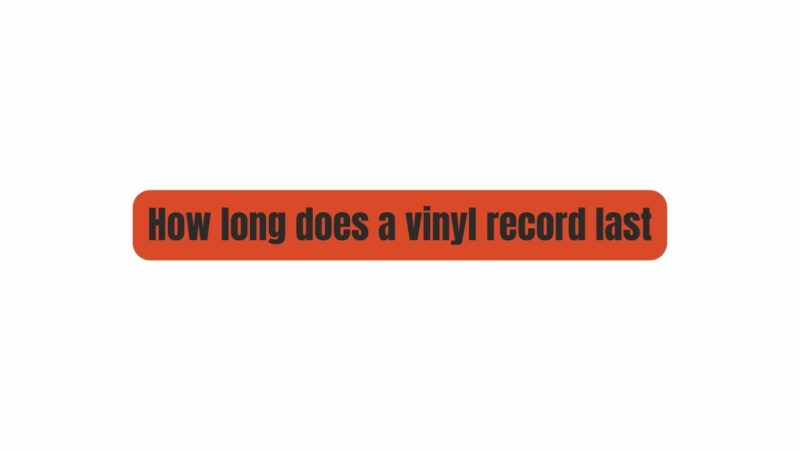Vinyl records have enjoyed a remarkable resurgence in recent years, captivating music enthusiasts with their unique sound and tangible charm. Collecting vinyl records is not just a hobby; it’s a journey into the history of music and a connection to the past. However, one question often lingers in the minds of vinyl enthusiasts: how long does a vinyl record last? In this article, we will explore the factors that affect the longevity of vinyl records, the signs of wear and degradation to watch out for, and essential practices for preserving your vinyl collection for generations to come.
The Lifespan of a Vinyl Record
The lifespan of a vinyl record is influenced by various factors, making it challenging to provide a specific number of years that a record will last. Instead, we can examine the key elements that affect the durability of vinyl records:
1. Vinyl Quality: The quality of the vinyl material used to manufacture the record plays a significant role in its longevity. High-quality vinyl records are less prone to wear and degradation than those made from inferior materials.
2. Vinyl Thickness: The thickness of a vinyl record also impacts its durability. Thicker records are generally more robust and less susceptible to warping and damage.
3. Pressing Quality: The quality of the pressing process during record manufacturing is crucial. Records with well-centered grooves and minimal defects are likely to have a longer life.
4. Environmental Factors: Environmental conditions, such as temperature and humidity, can significantly affect the lifespan of vinyl records. Extremes in temperature and humidity can lead to warping, mold growth, and other forms of damage.
5. Handling and Care: How a vinyl record is handled and cared for has a substantial impact on its longevity. Mishandling, improper storage, and neglect can accelerate wear and damage.
Common Signs of Vinyl Record Wear and Degradation
To assess the condition of your vinyl records and gauge their remaining lifespan, it’s essential to be aware of common signs of wear and degradation:
1. Surface Noise: An increase in surface noise, including crackling, popping, and static, can indicate wear on the record’s surface.
2. Groove Damage: Visible damage to the grooves, such as scratches or scuffs, can affect sound quality and playback.
3. Warping: Warping occurs when a record loses its flat shape and becomes distorted. This is often caused by exposure to heat or pressure.
4. Dust and Dirt: Accumulated dust and dirt on the record’s surface can lead to sound quality issues and may require cleaning.
5. Groove Wear: Over time, the constant friction of a stylus in the groove can wear down the grooves, resulting in reduced audio fidelity.
6. Mold and Mildew: In humid environments, vinyl records are susceptible to mold and mildew growth, which can damage both the surface and the audio quality.
7. Oxidation: Exposure to air can lead to oxidation of the vinyl material, resulting in a duller sound.
Prolonging the Life of Vinyl Records
While vinyl records are not indestructible, there are several practices you can adopt to prolong their life:
1. Proper Storage: Store vinyl records vertically, like books on a shelf, to prevent warping. Maintain a stable environment with a temperature between 65-70°F (18-21°C) and a relative humidity of 40-50%.
2. Quality Outer Sleeves: Use high-quality outer sleeves to protect the album covers from dust and moisture.
3. Inner Sleeves: Replace or upgrade the inner sleeves with anti-static polyethylene or polypropylene sleeves to reduce friction and protect against scratches.
4. Handle with Care: Always handle vinyl records by the edges and avoid touching the playing surface to prevent oils and dirt from transferring.
5. Cleaning: Clean your records regularly using a carbon fiber or anti-static brush and a record cleaning solution for more thorough cleaning.
6. Store in Polythene Bags: Consider storing records in polythene bags to provide an extra layer of protection against dust and debris.
7. Maintain Your Turntable: Keep your turntable in good working condition, ensuring that the stylus is clean and properly aligned.
8. Avoid Direct Sunlight: Store records away from direct sunlight and heat sources to prevent warping and damage.
Conclusion
The lifespan of a vinyl record is influenced by various factors, making it challenging to predict an exact duration. However, with proper care, storage, and handling, you can significantly extend the life of your vinyl collection. While vinyl records are not immortal, they offer a unique and enduring listening experience, connecting us to the music of the past and preserving it for future generations. So, cherish your vinyl records, treat them with care, and enjoy the analog magic they bring to your life.


